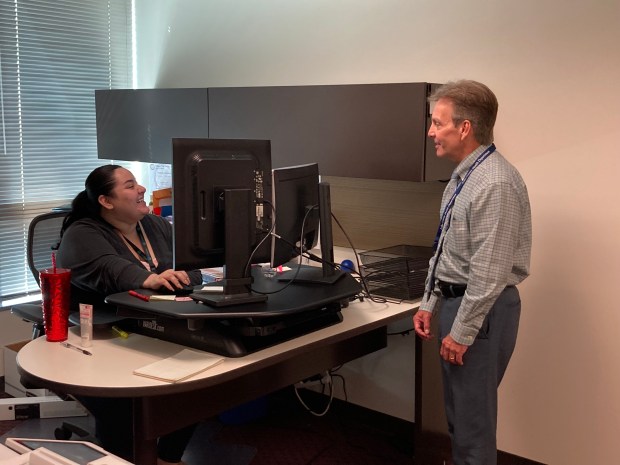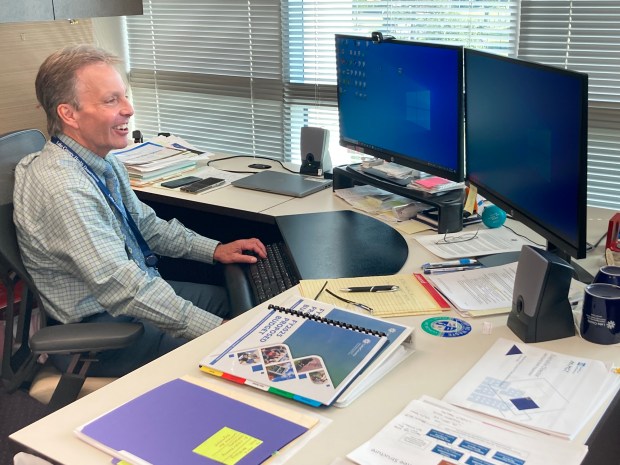Dealing with fears of a pandemic from the H1N1 flu virus in 2009 gave Lake County Health Department Executive Director Mark Pfister experience with mass vaccinations leading to the county being the state’s most vaccinated when COVID-19 struck.
Calling the H1N1 virus virulent, Pfister said he observed some of the same resistance to large-scale vaccination pushes 12 years ago which surfaced again in early 2021 when plans to inoculate a large majority of the population were developed.
“There were lessons learned,” Pfister said. “We knew what was not effective with the older people in some groups. We made changes when we dealt with COVID-19. We got local leaders to show it was okay.”
Creating a clinic at the Greenbelt Cultural Center in North Chicago in conjunction with AbbVie in February 2021, Pfister said it was an effort to motivate seniors in the African American community to get their shots.
North Chicago Mayor Leon Rockingham, Jr. got his first dose in front of a gaggle of TV cameras. Then Waukegan Mayor Sam Cunningham made it clear that fears of his community arising from the Tuskegee experiments between 1932 and 1972 should no longer exist.
“These things led us to become the most vaccinated county in the state,” Pfister said.
Pfister intends to retire from a 33-year career with the health department — he became executive director in 2017 — on Sept. 3 with plans to move to Washington state keeping a long-term promise to his wife.
A goal of living in the Pacific Northwest was something Pfister said he and his wife considered for a long time. Each time he got a new position or a promotion at the health department, he felt he had another goal to achieve.
“It took a long time to keep that promise,” Pfister said at the Aug. 13 Lake County Board meeting where he was honored with a resolution, “I knew I couldn’t wait any longer. I’m going to get back into nature in some form.”
Though he said he has no intention of pursuing another executive director position, Pfister said he intends to be both intellectually and physically active. He does know how he will start his retirement.
“At first I’m going to relax a little bit, do nothing for a while, and then make a decision” Pfister said. “I may do something with the environment. I’ll see what develops.”
Growing up in Denver, a career in public health was not Pfister’s plan after graduating from Augustana College in Rock Island with undergraduate degrees in biology, psychology and environmental science.
With a goal of eventually becoming a dentist, Pfister joined the Peace Corps in 1986 while he thought about where to attend dental school. Assigned to Cameroon in West Africa, a natural disaster changed his trajectory toward public health.
“A cloud of carbon dioxide formed over a lake,” Pfister said. “It’s heavier than air and it dropped down into a valley killing 1,700 people and 4,000 cattle. We had to teach the Fulani (tribe) a new way to care for cattle with rotating pastures like they do in Wisconsin.”
Returning to the United States in 1988, Pfister said got advanced degrees at Indiana University in Limnology — fresh water. In 1991 joined the Lake County Health Department as a limnologist keeping Lake Michigan and the county’s numerous lakes healthy.
As he moved into positions of more and more responsibility on his way to leading the department, Pfister said he developed a set of values. He came to believe a zip code had more to do with longevity than much else.
Understanding the term food deserts where areas did not have a grocery store or access to healthy food, Pfister said there is also something he labels a “food swamp.” It also has negative public health impacts.
“People eat inexpensive, high caloric, high fat, high cholesterol food which leads to diseases like diabetes and obesity,” Pfister said.
As he worked his way to executive director, Pfister said he wanted to find ways to make a difference in the lives of Lake County residents helping them to lead more healthy lifestyles.
By the time Lake County recorded its first case of COVID-19 on March 11, 2020, Pfister was ready to lead the department and the county through what Lake County Board Chair Sandy Hart called the public health crisis of historic proportions.
“Mark Pfister led us through the most difficult public health crisis in the last 100 years,” Hart said. “He was unwavering in his leadership and will be sorely missed.”
Initially coaching his department to communicate to everyone they could people needed to practice the three Ws — wash your hands, watch your distance, and wear a mask — he also knew how the development of a vaccine was being prioritized. He developing plans to get as many people vaccinated as possible.
An early effort at creating the popularity of vaccination was the Greenbelt site. He also established locations for teachers to get their shots so schools could reopen and children could return to the classroom.

Establishing a drive-through vaccination clinic at the Lake County Fairgrounds, Pfister said he was creating a place where there was as little contact between people as possible to avoid the spread of the disease.
As masks and other personal protection equipment became more plentiful, Pfister said they moved to large sites for mass vaccination because more people could get their shots there.
Tim Sashko, the president of the Lake County Board of Health and a 21-year member of the panel, said he had the opportunity to watch Pfister grow as a leader over the years as he moved into positions of greater responsibility.
“He lives what he does and through this he always makes a difference,” Sashko said. “He embraces the changes we need to make in lifestyle. He is a sponge of knowledge and he grasps the entire kaleidoscope of needs.”





